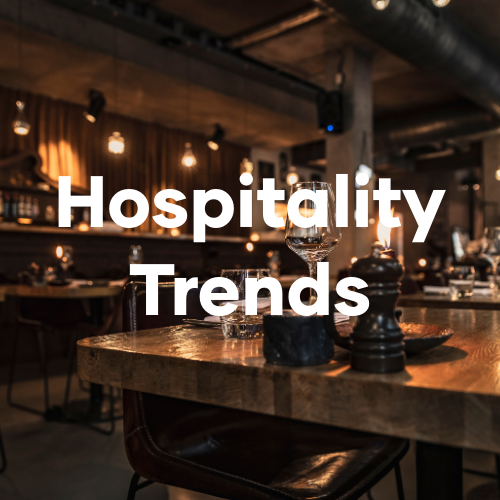5 trends shaping the future of hospitality for suppliers

Hospitality in the UK is moving at speed. From the way guests book their meals to the spaces they choose to dine in, 2025 is already showing a shift in behaviours and expectations. For suppliers, these changes highlight where operators need fresh ideas, and how you can help them weave these trends into their outlets, while also pivoting your own business to stay ahead.
6.12pm is the New 9pm
One of the clearest shifts is when people dine out. According to Caterer Licensee the average UK dinner booking is now 6.12 pm, with just 2% of reservations happening after 9 pm. The Financial Times states that in London, 6 pm bookings are up by 11% year-on-year while 8 pm slots are falling away. Operators are adapting with earlier menus, dynamic pricing and new scheduling models. For suppliers, the opportunity lies in developing products and solutions that suit shorter dining windows and faster table turn arounds - from menu items designed for quick execution to technology that smooths booking flows. Helping operators reframe their offer around new dining times also allows you to pivot your portfolio in line with changing customer behaviour.
Smarter Kitchens, Smarter Margins
Behind the scenes, kitchens are getting smarter with connected equipment that can monitor inventory, reduce energy waste, and improve consistency. For suppliers, this is about more than selling hardware, it’s about positioning your products as part of an efficiency strategy. From equipment that reduces prep time to digital tools that link front and back of house, you can help operators respond to staff shortages and rising costs, while also future-proofing your own brand as a partner in productivity.
Hospitality Goes Hybrid
We’re also seeing the rise of hybrid hospitality spaces. Cafés, hotel lobbies and restaurants are increasingly doubling as informal work hubs by day before switching to social venues at night. The Times reported that hotels are re-positioning themselves as “work from anywhere” destinations, while Boutique Hotel News suggests hybrid models can boost turnover by up to 20%. For suppliers, the question is: how can your products flex with the space? Modular furniture, portable equipment, or menu concepts that can switch seamlessly from coffee service to cocktails enable operators to maximise every part of the day. Pivoting towards adaptability in your product line ensures you remain relevant as operators reimagine their venues.
The Sober Curious Surge
On the menu, health-conscious dining and mindful drinking continue to grow. The sober-curious movement, building over the past few years, shows no signs of slowing in 2025. Grocery Gazette reports alcohol-free beers from Guinness and Heineken growing by 271% and 230%, and low/no spirits up 85%. For suppliers, this means thinking beyond traditional product lines and helping operators curate wellness-driven menus and sophisticated alcohol-free options. By embedding health and balance into your range, you don’t just support your customers - you also ensure your business grows with one of the strongest consumer movements in hospitality.
From Service to Spectacle
Finally, 2025 is underscored by the enduring demand for experience-driven dining. According to The Guardian, guests, especially Gen Z, want more than just a meal. From immersive supper clubs to Instagram-ready interiors, operators are under pressure to deliver theatre and storytelling as part of the customer journey. For suppliers, the opportunity lies in helping operators add a layer of spectacle - whether that’s tableware that enhances presentation, décor and design features that create atmosphere, or food and drink concepts that surprise and delight. By aligning your offer with the operator’s need to wow their guests, you can position your products not just as functional, but as experience-enablers.
Taken together, these five trends highlight where operators are adapting - and how suppliers can help them seize the moment. By shaping your products, services and stories around these shifts, you’ll not only support your customers in capitalising on new opportunities, but also pivot your own business to thrive in 2025 and beyond.
)
)
)
)
)
)
)
)
)
)
)
)
)
)
)
)
)
)
)
)
)
)
)
)
)
)
)
)
)
)
)
)
)
)
)
)
)
)
)
)
)
)
)
)
)
)
)
)
)
)
)
)

)
)
)
)
)